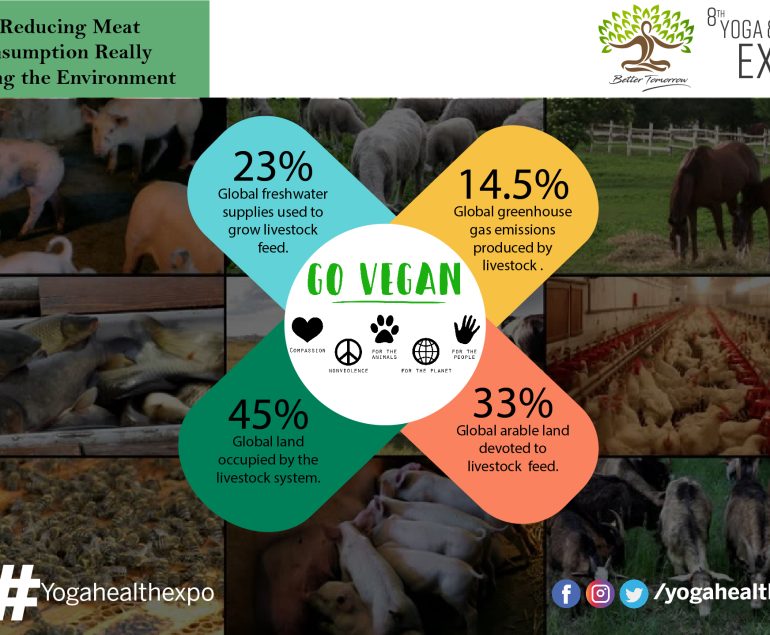In recent years, the global shift towards sustainable living has prompted individuals to reevaluate their lifestyles and make conscious choices that benefit themselves and the planet. One such intersection of mindful living practices is the fusion of sustainable yoga, which emphasizes harmony with nature, and veganism, a dietary choice that abstains from animal products.
This powerful fusion resonates with the core tenets of yoga, embodying ahimsa (non-harming) and satya (truthfulness), while contributing to the worldwide endeavor to address climate change and safeguard biodiversity.
This blog delves into the intricate relationship between sustainable yoga and veganism, illustrating how these practices combine to create a holistic approach to wellness and environmental stewardship.
The Ethical Roots of Yoga and Veganism
Originating in ancient India, yoga is a comprehensive system of practices encompassing the physical, mental, and spiritual realms, aiming to attain harmony and equilibrium within oneself and the surrounding environment.
One of the foundational principles of yoga is ahimsa, which advocates non-violence and non-harming towards all living beings. This ethical guideline extends beyond the yoga mat and is intimately linked with the choice of sustenance.
Veganism, liewise, finds its roots in compassion and non-violence. It is a conscious lifestyle choice to abstain from consuming animal products, recognizing conventional animal agriculture’s inherent suffering and environmental impact. By choosing plant-based alternatives, vegans align themselves with the principles of ahimsa, creating a compassionate relationship with all sentient beings.
Eco-conscious Living in Yoga
Sustainable yoga expands beyond the individual practice, emphasizing an eco-conscious lifestyle that respects and reveres the natural world. This extends to choices like eco-friendly yoga mats made from biodegradable waste using sustainable yoga apparel, and practicing in outdoor settings to foster a deeper connection with nature.
Moreover, sustainable yogis often engage in practices such as reforestation initiatives, beach clean-ups, and supporting local organic farms, actively contributing to the preservation of the environment.
The Synergy: Yoga and Veganism
The synergy between sustainable yoga and veganism is evident in the shared principles of ahimsa, Satya (truthfulness), and asteya (non-stealing). By choosing a vegan diet, individuals embody ahimsa by abstaining from the harm caused to animals in producing meat, dairy, and other animal-derived products.
This choice aligns with Satya, as it acknowledges the suffering and environmental toll associated with conventional animal agriculture. Furthermore, the vegan lifestyle embraces asteya by refraining from stealing resources that could be redirected towards feeding the hungry and conserving natural habitats.
Health Benefits of Veganism in Yoga Practice
Veganism, a dietary choice that abstains from all animal products, has gained popularity for its numerous health benefits. When combined with a yoga practice, vegan eating can enhance physical, mental, and spiritual aspects, creating a synergistic effect that promotes overall well-being. Here are some of the key health benefits of incorporating veganism into a yoga practice:
1. Improved Digestion: A plant-based diet rich in fiber from fruits, vegetables, whole grains, and legumes supports healthy digestion. This can reduce issues like bloating, constipation, and indigestion, providing practitioners with a comfortable and light feeling during yoga sessions.
2. Enhanced Flexibility and Mobility: Plant-based foods are naturally anti-inflammatory, which can help reduce stiffness in joints and muscles. This can increase flexibility and improve range of motion, allowing practitioners to delve deeper into yoga poses and transitions.
3. Increased Energy Levels: Whole plant foods are packed with complex carbohydrates, providing a steady and sustained energy source. This is particularly beneficial for yoga practitioners who require endurance for longer or more challenging sessions.
4. Optimal Nutrient Intake: A thoughtfully structured vegan diet can give the body all the necessary nutrients for optimal health. This includes vitamins, minerals, antioxidants, and phytonutrients that support overall wellness, muscle function, and recovery.
5. Lower Cholesterol Levels: Veganism, when done properly, can lead to lower levels of cholesterol, particularly harmful LDL cholesterol. This reduces the risk of cardiovascular diseases, essential for maintaining a healthy heart and circulation.
6. Maintaining a Healthy Weight: Vegan diets tend to be lower in saturated fats and calories compared to diets that include animal products. This can help with weight management if the diet includes a balanced variety of plant-based foods.
7. Improved Mental Clarity and Focus: The absence of processed and chemically-treated animal products can lead to mental clarity and increased focus. This is particularly beneficial for meditation and mindfulness practices that require concentration.
8. Enhanced Detoxification: Plant-based diets support the body’s natural detoxification processes. The high fiber content aids in eliminating toxins from the digestive tract, while the phytonutrients found in fruits and vegetables promote liver health.
9. Balanced pH Levels: Many animal products are acidic, potentially disrupting the body’s natural pH balance. On the other hand, plant-based diets tend to be more alkaline, helping maintain a healthy pH level in the body.
10. Improved Emotional Well-being: A vegan diet is associated with lower levels of depression and anxiety. The abundance of nutrients and the absence of certain additives commonly found in processed animal products can contribute to better mental health.
Environmental Impact: The Power of Plant-Based Eating
The environmental implications of adopting a vegan lifestyle are profound. Conventional animal agriculture contributes to deforestation, water pollution, greenhouse gas emissions, and species extinction. Sustainable Yoga: The Synergy of Eco-friendly Practices and Vegan Eating” delves into the harmonious relationship between mindful yoga practices and the power of plant-based Lifestyle.
By choosing plant-based alternatives, individuals reduce their carbon footprint and help alleviate the strain on natural resources. Additionally, supporting local and organic agriculture further minimizes transportation emissions and promotes sustainable farming practices, contributing to a more resilient and regenerative food system.
Conclusion: Cultivating Harmony Within and Beyond
Sustainable yoga and veganism represent a harmonious union of ethical living, mindful consumption, and environmental stewardship. Together, they form a powerful framework for individuals to align their actions with their values, fostering a deeper connection with themselves and the natural world.
By embracing the principles of ahimsa, Satya, and asteya, sustainable yoga, and veganism, practitioners enhance their well-being and become catalysts for positive change, contributing to a more compassionate, sustainable, and harmonious global community. This collective effort can forge a brighter, more balanced future for future generations.









